Gum Disease Treatment West Palm Beach
Targeting Bacteria at the Source
At our dental office, we go beyond simply taking care of your teeth. While they are essential to your oral health, your gums also matter tremendously as well. They provide important support and protection for the teeth. However, if too much plaque and bacteria accumulate on them, they can easily develop an infection (called gum disease or periodontal disease) that can cause a wide variety of dental and overall health problems. That is why Dr. Mihran Asinmaz and our team at Palm Beach Dental Excellence will always examine your gums during your regular checkup, and if you show any signs of infection, we can quickly treat it using gum disease treatment in West Palm Beach, FL.
Why Choose Palm Beach Dental Excellence for Gum Disease Treatment?
- Safe & Proven Effective Solutions Used In-House
- We Cater to Your Needs During Each Appointment
- We Welcome Your Dental Insurance
What Is Gum Disease?
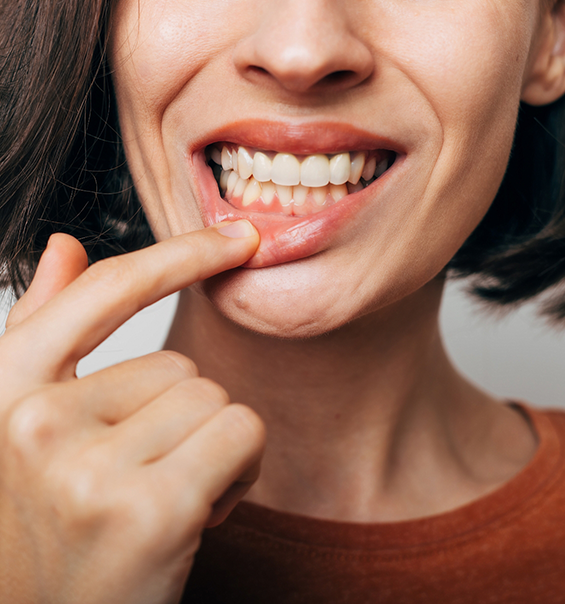
Gum disease is the most common chronic bacterial infection in adults and is also the number one reason for tooth loss in the U.S. It is estimated that at least 50% of the population has some degree of periodontal disease. How does it begin and progress?
Everyone’s mouth contains the bacteria that cause periodontal disease. When the number of these bacteria accumulates, they begin to break down healthy gum and bone, and this can severely impact a person’s oral health.
Over time, the plaque built up on teeth can harden and become trapped at the base of the tooth. This hardened plaque substance is called calculus.
The bacteria in plaque and calculus release toxins that are destructive to your gums and surrounding tissues. If these substances are not removed with regularly scheduled hygiene appointments and proper daily home care, the gums can become inflamed and infected, which is known as gingivitis.
Left untreated, gingivitis may progress and can create deep pockets (gaps) or cause your gums to recede or pull back. This exposes the roots of your teeth and allows bacteria to grow below the gumline. This stage of the infection is called periodontitis. Over time, the bones, gums, and tissue that support the teeth are weakened, and the teeth can become loose and may need to be removed.
Symptoms of Gum Disease
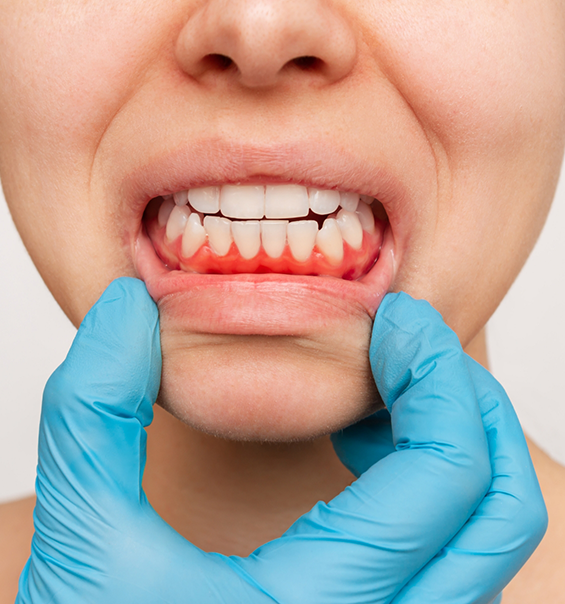
Because early gum disease symptoms are often mild, many people are not aware of their condition until it becomes more serious.
Here are some common symptoms of gum disease:
- Persistent bad breath: The bacteria that cause gum disease release toxins that can cause bad breath (which doesn’t always go away after you brush your teeth).
- Tender or painful gums: Receding gums and exposed tooth roots can cause added sensitivity.
- Bright red gums: Even a subtle change in the color of your gums can be a sign of gum disease.
- Swollen gums: A gum infection can cause the gums to swell.
- Bleeding gums: Bleeding is a common symptom of gum disease. Healthy gums should not bleed during brushing, flossing, or a standard dental exam.
- Gaps: Periodontal disease causes a gap, or pocket, to form along the side of your tooth.
- Loose teeth: It’s not normal to have teeth that can wiggle (at any age).
- Tooth alignment changes: Periodontal disease can cause your teeth to change position over time due to the loss of gum and bone support.
You may not have these symptoms today, but they may develop in the future, so it’s important to maintain a consistent oral care routine.
Scaling & Root Planing
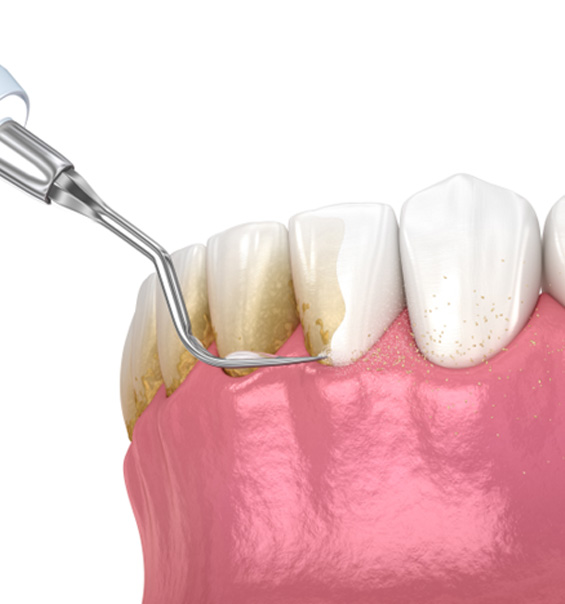
Scaling and root planing is a two-step process that is designed to treat the early stages of gum disease and prevent it from worsening. First, we will clear away all the plaque and tartar from above and below your gumline to control the accumulation of dangerous oral bacteria. This can help restore the health of your oral tissues and reduce symptoms including inflammation and tenderness. Next, we’ll smooth out the roots of your teeth so your gums can healthily reattach to them.
Do I Need Scaling & Root Planing?
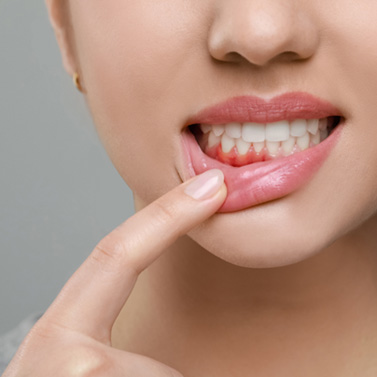
If you’re experiencing warning signs of gum disease, including bleeding while brushing or flossing, receding gums, visible plaque buildup, swollen or puffy gums, or chronic bad breath, you may benefit from scaling and root planing.
Early stages of gum disease can often be remedied by good at home oral hygiene practices, but if the condition has progressed, scaling and root planing may be necessary to prevent further damage.
The Process of Scaling & Root Planing
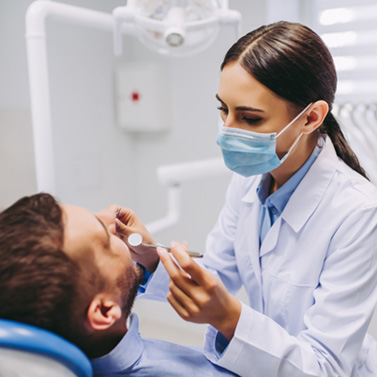
Typically, this treatment takes place over the course of two appointments:
- First – Using a device called a scaler, we will clear away all plaque and tartar from the surface of the teeth, going as far down as the pockets of the gums.
- Second- During the second portion of the process, your dentist will remove any hardened bacterial deposits on the roots of your teeth that may be hidden beneath the gumline. This will help prevent further infection by stopping the bacteria from re-colonizing in the gums.
Aftercare Tips for Scaling & Root Planing

Because scaling and root planing can be an intensive treatment, it may take a few weeks for your teeth and gums to fully recover. You may experience increased sensitivity and discomfort as a natural part of the healing process. Here are some general aftercare tips for this treatment:
- Rinse your gums with warm saltwater after each meal to prevent irritation and loosen any food debris around your teeth. This will make flossing and brushing much easier. You can make this solution by combining ¼ teaspoon salt for each eight ounces of water.
- After treatment, be sure to brush carefully and do not use a hard-bristled toothbrush, only soft-bristled. This will help minimize irritation and bleeding. Furthermore, instead of brushing in a back-and-forth motion, brush in slow, circular motions to avoid worsening discomfort throughout the healing process.
- Your teeth and gums may be sensitive to certain foods and beverages after this procedure, so it’s best to avoid anything hot or spicy, as well as alcohol and acidic beverages, as these can cause inflammation and irritation. Also, do not smoke or use tobacco products.
- Stick to a soft diet for the first 48 hours following treatment.
- Avoid any intensive physical activity directly after your procedure. This will help you avoid prolonging the healing process.
Antibiotic Therapy

ARESTIN© is a locally administered antibiotic treatment for periodontal disease. The active antibiotic is minocycline (a member of the tetracycline family).
Our team may recommend ARESTIN© as an adjunct to scaling and root planing to reduce deep pockets and control inflamed gum tissue.
ARESTIN© may also be used as part of a periodontal maintenance program to help improve localized areas of deeper pockets and inflammation.
Gum Disease Can Affect More Than Just Your Gums!

It is so vitally important to recognize that periodontal disease has far-reaching consequences beyond your oral health alone. Below is what research is beginning to show:
- Research has indicated that periodontal disease increases the risk of heart disease and strokes.
- Diabetics are more likely to develop periodontal disease, which can increase blood sugar and diabetic complications.
- Researchers have suggested that a link exists between osteoporosis and bone loss in the jaw, leading to tooth loss.
- Research has found that bacteria that grow in the oral cavity can be transferred to the lungs, causing respiratory diseases such as pneumonia, especially in people with periodontal disease.
- Researchers have found that men with gum disease were 49% more likely to develop kidney cancer, 54% more likely to develop pancreatic cancer, and 30% more likely to develop blood cancers.
As you can see, when it comes to your health, making sure your gums are well taken care of is essential. If you are experiencing any of the symptoms we listed above, please call us as soon as you can. The quicker we can intervene, the faster and easier your treatment will be. To schedule an appointment, please contact our dental office today.
